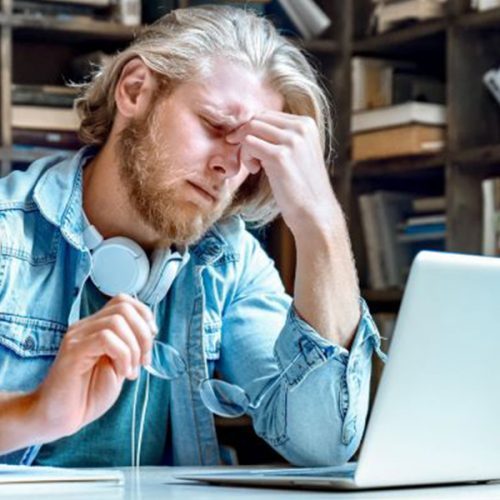The COVID-19 pandemic has led to an increase in screen time for both adults and children. Between remote work and school, and few opportunities to socialize with friends and family in person, people of all ages have to rely heavily on the use of computers, smart phones and tablets in their daily lives. But what does the increase in screen time mean for our eyes? Focus spoke with Amy C. Watts, OD, on how excessive screen time can negatively impact eye health and how best to prevent vision damage.
In light of COVID-19, daily screen time has dramatically increased for many of us. At the end of a day filled with virtual meetings, remote learning and socializing, it’s not only our brains that need a break. Our eyes can feel dry, scratchy, and sometimes even achy. Dr. Amy Watts, an optometrist and director of the Optometry and Contact Lens Service at Mass Eye and Ear, told Focus how too much screen time can cause eye strain.
How screen time causes tired or strained eyes
According to Dr. Watts, when we use devices like computers, tablets and phones, or perform other visually demanding tasks, we tend to blink less. “Blinking spreads the tears evenly across the front surface of the eye and helps to keep it hydrated,” she said. “When we don’t blink often enough, tears begin to evaporate and leave our eyes feeling dry, tired, scratchy or burning.”
Dr. Watts also explained that focusing on screens up close can be tiring for our eyes. “The closer we hold a device up to our face, the more work we have to do to focus our eyes,” she said. Doing this for long periods of time can cause the feeling of eye strain, often described as tired or achy eyes. Some people even develop headaches from prolonged reading up close, especially if they are experiencing blurred vision due to an uncorrected refractive error like nearsightedness (myopia), farsightedness (hyperopia) or astigmatism.
Can too much screen time have long-term effects?
Although there is little evidence that excessive screen time can cause long-term damage to the eyes, our increasing reliance on screens for work, school and socializing has led to an escalation of dry eye symptoms among patients. To avoid dry eye and eye fatigue, there are a couple of simple changes you can make to your routine and work station.

Avoiding eye strain and dry eyes…without ditching your screens
Ideally, we would all spend less time in front of our screens, but that isn’t always possible, especially during the current pandemic. To avoid eye strain, Dr. Watts advises her patients to use the “20/20/20 rule.”
“We recommend that you try to look 20 feet [or further] away from your computer or other device, every 20 minutes for at least 20 seconds,” she said. This gives your eyes regular breaks, so that fatigue doesn’t set in. “Some of my patients set a timer on their computer so they don’t forget, which I think is a great idea.”
For those experiencing dry eyes, Dr. Watts suggests using non-preserved artificial tears for dryness symptoms when needed. “Patients who are prone to dryness, should plan to use the tears even before symptoms begin. I recommend using one drop in each eye every two to three hours during the workday.”
Modifying your work station can also help. Dr. Watts recommends adding more light, if needed, and facing away from your heating and air conditioning units. “Dry eye issues can be exacerbated by hot or cold air blowing into your eyes,” she said.
What about blue light exposure?
Blue light is a hot topic, but not always well understood. Emitted from our computers, TVs, smart phones and tablets, one of the biggest misconceptions about blue light is that it causes eye strain and headaches. But according to Dr. Watts, that isn’t actually the case.
“It’s been well documented that blue light exposure does not cause eye strain and headaches, but rather the dry eye and constant near focusing creates these symptoms,” she said.
However, blue light exposure can keep you awake at night. Blue light is known to boost attention, reaction times and mood. This can be helpful during daylight hours, but not ideal before bedtime. “Blue light can impact your circadian rhythm and make sleep more difficult,” said Dr. Watts.
To combat the effects of blue light on your natural sleep cycle, Dr. Watts recommends using a blue light filter on your device three to four hours before bed. “I personally use the night mode on my cell phone, which reduces the amount of blue light coming from my screen, and have it set to turn on automatically each day from 6pm-6am. I set my kids’ devices to night mode from 4pm-6am,” she said.
There are many blue-light-blocking eye glass lenses and filters on the market, but Dr. Watts has reservations about them. “A high-quality lens or filter should be okay, but you need to be careful about what you purchase. Spectacles and filters that are poor optical quality can degrade the image from the screen and cause blur and make eye strain worse,” she said. If you are interested in blue-light blocking eyeglasses, Dr. Watts recommends a visit to a trusted optical shop to ask a certified optician or licensed optometrist for help.
About Our Expert
 Amy C. Watts, OD, is an optometrist and the Director of the Optometry and Contact Lens Service and the Vision Rehabilitation Service at Mass Eye and Ear. To make an appointment with an optometrist, please call 617-573-3202.
Amy C. Watts, OD, is an optometrist and the Director of the Optometry and Contact Lens Service and the Vision Rehabilitation Service at Mass Eye and Ear. To make an appointment with an optometrist, please call 617-573-3202.

